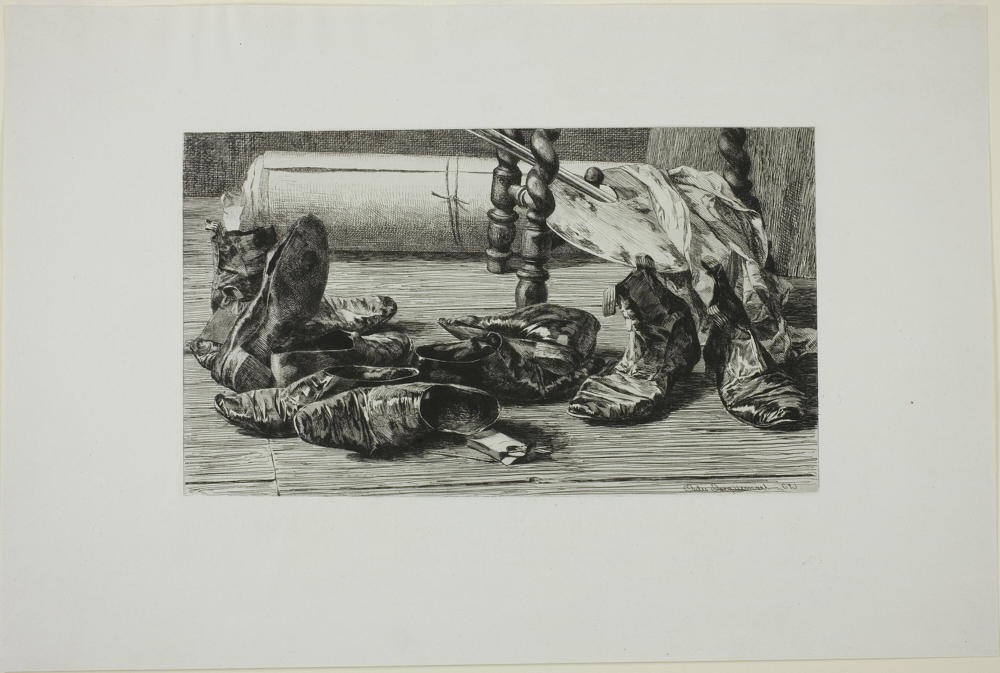SideTrips

Jules F. Jacquemart: Mementos of a Trip (1862)
" … they insist we were all created equal."
Every forebear contributed their share of what eventually became me. My mother and father provided equal amounts of each of themselves as their parents did before them. Likewise, their grandparents did their part, too, and their parents before them. Over succeeding generations, a single generation's contribution gets diluted, but the formula holds. My twentieth great-grandmother contributed just as much as my twentieth great-grandfather. Yet, I tend to follow the family name backward rather than engage in many SideTrips to see what my umpteenth great-grandmother's family might have provided. Not every SideTrip goes anywhere, for only the elites ever inherit much of a family tree. It takes notoriety to guarantee that anybody remembers anybody, that, or a string of very conscientious and fortunate grandmothers. This kind maintain records in bibles and never loses their homes to fires. It's a wonder many records survive at all.
I felt curious about my second great-grandmother, Elizabeth Lovelady, who died in childbirth along the Applegate extension of the Oregon Trail on November 13, 1845, leaving my great-grandfather John Bird Bounds an orphan at twelve. Welcome to Oregon, indeed! I wondered what sort of people she came from. She was born in Sevier or Jackson County, Tennessee, in about 1803, a decade before Andy Jackson started seriously cleaning out The Creek from that territory. Like my Mayfield forebears, they'd likely slipped over into the Indian Reserve and, by necessity, lived as "Indian Fighters." I've seen this movie before. Sure enough, Elizabeth's father, Thomas Lovelady, married her mother, Jane Ware, on October 8, 1792, In Greene County, Tennessee. Thomas had been born on the other side of The Cumberland Gap, in Guilford County, North Carolina, in 1767. Jane Ware had been born about 1774 in Virginia.
Jane's family tree interested me. Her father, John, and grandfather, Robert Ware, are listed as veterans of The Revolutionary War. Robert's father, also a Robert (paranthetically labeled Robert of Nutfield), had come from Ulster to Massassachuttes in a boatload of refugee Presbyterians in the late sixteen hundreds. He spelled his surname Weir. The Pilgrims refused to allow this group to settle on their plantations, so they asked the neighboring New Hampshire Colony governor if he might grant them land. He accommodated them, and Robert was recorded as among the original leaseholders of a plantation known as Nutfield. Robert and his group were likely among those Protestant Scots forcibly relocated to Ulster after the English Civil War. They didn't stay an entire generation.
The Weirs were Lairds of a Scottish estate, Blackwood, another of those which probably arose out of land Charlemagne granted to loyal knights after Hastings. It's just another standard minor British royalty story. I traced the line to one Rothaldus Weir of Blackwood, around thirteen seventy. If I had been more inquisitive and my systems had been more up-to-speed, I could have gone further, but why bother? Every spouse in every generation of that series probably deserves similar queries, but my curiosity was quenched when I started seeing the repeating patterns again. Some in this line were born in Antwerp, Belgium, and two apparently died there around the time of the Dutch Revolt and immediately thereafter. I suspect that they might have been Protestants seeking similar believers, or they could have been supporters of The Spanish Hapsburg monarchy. Either could be possible.
I see the necessity of separating church and state written large in English history. The Puritan's insistence on enforcing specific religious practices and banning others left them at an eventual disadvantage. Roger Williams greatly influenced our country's embrace of tolerance, though a spirited minority today seeks to reverse this tradition in the name of a curious conservatism. Imagine you're in a boatload of religious refugees being rejected at the dock by a society founded by religious refugees, and see why that separation seems especially important.
None of what I would eventually become was ever written beforehand, regardless of what some of my Predestination Preacher forebears insisted. I seem an unlikely result, an impossible manifestation, unbelievably delicate, for I stand atop a structure seemingly much more fragile than any house of toothpicks or cards. I must be just as close to a random presence as any could ever be. This must make me both common and precious. I'm nothing special or nothing any more special than everyone else around me. Even the so-called least of us somehow survived the painstaking fabrication of our family's tree. Not everybody was so lucky. If we're not sacred, then nothing and nobody ever was. This must be what they mean when they insist we were all created equal.
©2024 by David A. Schmaltz - all rights reserved


